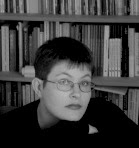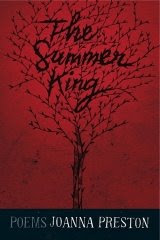
Joanna Preston’s first solo poetry collection, The Summer King: Poems, has just been published by Otago University Press. The manuscript won the 2008 Kathleen Grattan Award.
Joanna Preston was born in Sydney and spent her childhood in outback New South Wales. In 1994, she migrated to New Zealand, although from 2003 to 2006 she lived in the UK, where she gained an MPhil in Creative Writing from the University of Glamorgan. Her poems have been widely published, and won awards, in New Zealand and internationally. She has had work published in The Best Australian Poems 2005, edited by Les Murray, and in the prestigious 2007 Carcanet anthology New Poetries IV, edited by Eleanor Crawforth.
Joanna, The Summer King was launched on Montana Poetry Day, 24 July. How did the launch go?
It was a great night – the weather that day was horrible, but cleared up just in time. We had a full house, and the atmosphere was really buzzing. A real party feeling.
I am very impressed by the production quality of The Summer King – it’s a credit to the designer, Sarah Maxey, and to the publishers, Otago University Press. Are the physical qualities of a book important to you, or are you a person for whom it’s mainly about the words?
The words, every time. If the book is rubbish, then no amount of gorgeous presentation will save it. But … it’s a bit like the question from Gentlemen Prefer Blondes. “Don’t you know that a boy being rich is like a girl being pretty? You wouldn’t marry a girl just because she’s pretty, but my goodness, doesn’t it help?”
There are some books that you just can’t help picking up. You hope that the cover design will make people want to look at the book, and that the contents will make them want to keep it. I think Sarah and Wendy have delivered exactly that, and I am so incredibly grateful to them.
 In her preview of The Summer King on Beattie’s Book Blog, Helen Lowe described you as a narrative poet. ‘Narrative poetry’ makes me think of Sir Patrick Spens and the Border Ballads. Do you think of yourself as a narrative poet, and if so, in what sense? How is that manifested in the collection?
In her preview of The Summer King on Beattie’s Book Blog, Helen Lowe described you as a narrative poet. ‘Narrative poetry’ makes me think of Sir Patrick Spens and the Border Ballads. Do you think of yourself as a narrative poet, and if so, in what sense? How is that manifested in the collection?
I grew up with the Australian poetic narrative tradition, so I’ve got those sorts of inclinations fairly deeply ingrained. As much as anything, I call myself a narrative poet because I’m not really a lyric poet. There’s almost always a story behind the poem. It’s most obvious in persona poems like “Lighthouse-keeper”, but it’s there in most of them. I guess it comes down to how you define “narrative” and “lyric” poetry, and it may be that the distinction is no longer useful.
You are a poetry reviewer yourself. Does that make you more, or less, or not at all nervous about the critical reception The Summer King may receive?
Tim, I’m absolutely terrified. I am a complete and utter coward. Of course I want everyone to love the book, but I know that there will be plenty of people who don’t.
My intention is to try to not read the reviews. If there’s something that needs to be addressed, I’m sure I’ll be told and will try to address it. But ultimately the reviews have nothing to do with me. You don’t review a book for the author – you do it for other readers.
(That sounds impressively adult, doesn’t it? I suspect the truth will involve a lot more cringing, but we’ll see.)
You lived in the UK for three years, where you completed a Master of Philosophy in Creative Writing at the University of Glamorgan. Do you still have a strong connection to the poetry scene in the UK in general, and to your tutors and peers at the University of Glamorgan in particular?
Once a Glam Girl, always a Glam Girl! There’s a private mailing list for alumni, so we all keep in touch and up to date with each other’s successes. It’s a fantastic resource – no matter what the literary question, one or other of us will have an answer. We actually form a surprisingly extensive international network. It’s a little bit skewed by the fact that I was the only survivor of my cohort …
“The only survivor of my cohort” sounds distinctly ominous. Please explain!
Well that’s a slight exaggeration. Two of us (out of eight) made it to the final residency, but so far I’m the only one to have gone through submission and viva. I think Barbara is planning to submit everything in the next few months, so I’ll be sitting on the (virtual) sidelines cheering for her when viva time comes.
The course is pretty highly thought of, and they fill the eight places a good six to eight months in advance. There’s usually two or three who drop out over the course of the two years (putting your life on hold for a one year full time course is one thing: much harder to juggle the same amount of work over a two year period while trying to maintain a normal life), but we ended up losing everyone except the two of us. Nothing sinister, just life getting in the way. Job promotions; illness; personal upheavals.
We started second year with three people deferring for another twelve months, and ended up with only two of us there for the last two residencies. It made for the most intense critical focus I’ve ever experienced – terrifying, exhausting, and quite exhilarating by the end. I think it ended up being about an hour and a half per session, just on one person’s poems. Then it’d be the other person’s turn. Then a change in the tutors, repeat, repeat again, and come back tomorrow to do the same again. Two residencies in a row! I don’t know how we survived it.
From what you’ve written on your blog, and from reading The Summer King itself, I’ve formed the impression that the craft of poetry is very important to you: that is, that a concern for the technical aspects of poetry is very strong in both your own work and your reaction to other poets’ work. Is that a fair assessment?
Absolutely. I’m a formalist by inclination, and that was only strengthened by my time in the UK. Welsh poetry in particular is incredibly musical. (And much loved by ordinary people – surely not a coincidence?) It’s not ornamentation: it’s an integral part of poetry. There are too many tin-eared poets. The Irish poet, Michael Longley, summed it up beautifully: “if many of the folk who call themselves poets were tightrope walkers, they would be dead.” Without craft, what do you have? Chopped up prose? Meaning is important, but it’s at least 50% in the hands (mind, rather) of the reader. Craft is the poet’s business.
Where’s the line between “poetry” and “chopped up prose”, and how do you determine what side of the line a particular piece of writing falls?
Good question! I’m sure there will be plenty of disagreement, but for me it comes down to music. If there’s no music, no rhythm, if the linebreaks don’t seem to be doing anything other than acting as airbags against the right hand margin … that’s prose, surely? The music doesn’t have to be pretty – it can jangle and be ugly, as long as it’s doing that for some sort of reason. I tell my students that poetry is, above all else, patterned language. There’s plenty of grey areas on the margins, and that’s what margins are for – to be the zone of “still awaiting classification”, or “other/pending review” or “mixed source, parentage uncertain”. Craft, craft, technique and craft.
But as I said, that’s my personal view. Not universally held, and subject to revision on a case-by-case basis.
Which poets have been most influential on your own work, and which poets do you most enjoy reading?
Oo, a long list, and it varies wildly. I’d have to start with Shakespeare, Donne, Coleridge, some Wordsworth. Elizabeth Barrett Browning, Christina Rossetti. Lorca I fell in love with when I was little, and he still makes me tingle. Of recent years – Kate Llewellyn, Geoffrey Lehmann, Les Murray (of course), Hughes and Heaney (ditto), Carol Ann Duffy, Simon Armitage, Selima Hill, Pascale Petit, Louise Glück, Carolyn Forché, Mary Oliver, Mark Doty, Li-Young Lee … if I add the NZ contingent we’ll be here all night.
Influences – Les Murray and Ted Hughes are fairly obvious. (I was given a copy of Lupercal when I was ten or eleven, and I still find his shamanistic poems utterly compelling.) And I’m trying to absorb some of the wildness of Pascale Petit’s work – she’s an criminally underrated poet. I can spend hours pouring over her poems, trying to see what makes them tick and how I can use that myself. Same with Louise Glück. And I have to work hard to not pick up Duffy-isms if I’ve been reading her.
What writing projects are you currently working on?
Trying to get back into the flow of writing properly! One of the downsides from the MPhil was that I burnt myself out a bit, getting everything completed and ready to hand in before we left the UK. It’s a little over three years since I finished, and I’ve really only written a handful of decent poems since then. It’s taken me quite a while to come to terms with that. But I’ve started to feel them again.
Finally, my favourite poem of the many fine poems in The Summer King is “Phlogiston”, and you’ve been kind enough to let me reproduce it below. I’m not going to ask you “what it’s about”, because its air of mystery is one of the things I like best about it. But I’m interested in the way its two-line stanzas (and single one-line stanza) work together. How do you decide the length of stanza to use for each poem you write?
You break lines for all sorts of reasons to do with rhythm and pattern and sound and emphasis, but a stanza break is a bigger thing. The best explanation I’ve come across is something that Stephen Knight worked hard to drum into my skull: there should be some sort of payoff to reward the reader for trusting you and crossing that white space into a new stanza. It sounds extreme, but it’s a good mental check. Maybe it’s a rhythm choice; maybe you’re following the logic of new thought: new paragraph. And those reasons work well. But … I like the idea of “little dramatic moments” (another Stephen Knight-ism – he was a very good tutor!), of the poem being like riding a cross-country jumping course – logs and fences and ditches, and the need to position the reader so that the flow through the poem is as true and exhilarating as possible. It’s not a bad aim to start with.
Phlogiston
by Joanna Preston
It glowered from its box
growling and hissing,
a beautiful thing, caged
behind a brass screen.
I hugged myself, stared
back at it for hours,
its scent draped
around me like fox-furs.
Dangerous
was just a word
until it escaped one night
and the neighbours came home
to nothing.
The calcined skull
of their yap-dog
crunched under my heel
like frozen grass.
“Phlogiston” was first published in Magma 35.


